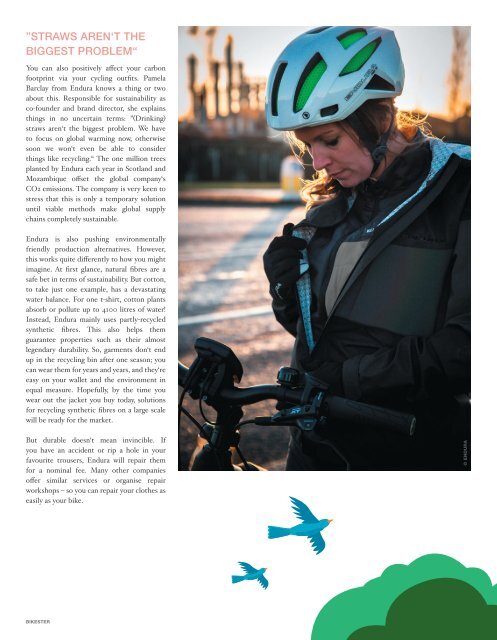Bikester Magazine EN Summer 2021
2020 was a tremendous year for cycling: a record number of people started riding and, thanks to that, can now get about more quickly and have more fun doing so than ever before. In this issue, we explore what can help continue this exciting trend: whether that's better infrastructure, going on exciting bike tours or bringing the right food with you. Let's enjoy as many places as possible by bike in 2021!
2020 was a tremendous year for cycling: a record number of people started riding and, thanks to that, can now get about more quickly and have more fun doing so than ever before. In this issue, we explore what can help continue this exciting trend: whether that's better infrastructure, going on exciting bike tours or bringing the right food with you. Let's enjoy as many places as possible by bike in 2021!
Create successful ePaper yourself
Turn your PDF publications into a flip-book with our unique Google optimized e-Paper software.
”STRAWS AR<strong>EN</strong>‘T THE<br />
BIGGEST PROBLEM“<br />
You can also positively affect your carbon<br />
footprint via your cycling outfits. Pamela<br />
Barclay from Endura knows a thing or two<br />
about this. Responsible for sustainability as<br />
co-founder and brand director, she explains<br />
things in no uncertain terms: ”(Drinking)<br />
straws aren‘t the biggest problem. We have<br />
to focus on global warming now, otherwise<br />
soon we won‘t even be able to consider<br />
things like recycling.“ The one million trees<br />
planted by Endura each year in Scotland and<br />
Mozambique offset the global company‘s<br />
CO2 emissions. The company is very keen to<br />
stress that this is only a temporary solution<br />
until viable methods make global supply<br />
chains completely sustainable.<br />
Endura is also pushing environmentally<br />
friendly production alternatives. However,<br />
this works quite differently to how you might<br />
imagine. At first glance, natural fibres are a<br />
safe bet in terms of sustainability. But cotton,<br />
to take just one example, has a devastating<br />
water balance. For one t-shirt, cotton plants<br />
absorb or pollute up to 4100 litres of water!<br />
Instead, Endura mainly uses partly-recycled<br />
synthetic fibres. This also helps them<br />
guarantee properties such as their almost<br />
legendary durability. So, garments don‘t end<br />
up in the recycling bin after one season; you<br />
can wear them for years and years, and they‘re<br />
easy on your wallet and the environment in<br />
equal measure. Hopefully, by the time you<br />
wear out the jacket you buy today, solutions<br />
for recycling synthetic fibres on a large scale<br />
will be ready for the market.<br />
But durable doesn‘t mean invincible. If<br />
you have an accident or rip a hole in your<br />
favourite trousers, Endura will repair them<br />
for a nominal fee. Many other companies<br />
offer similar services or organise repair<br />
workshops – so you can repair your clothes as<br />
easily as your bike.<br />
© <strong>EN</strong>DURA<br />
BIKESTER











